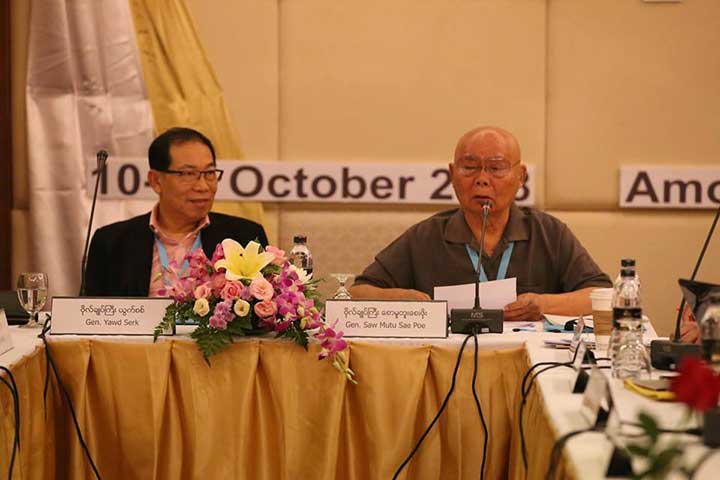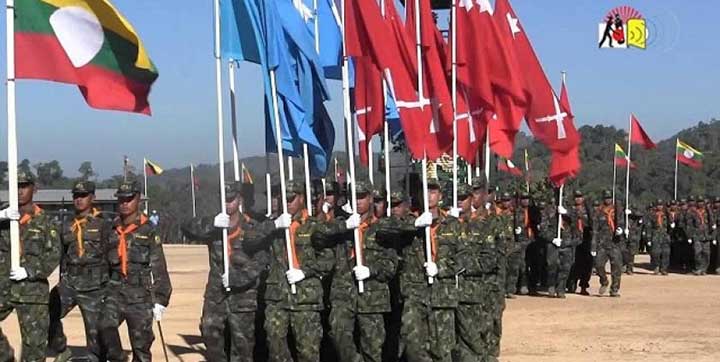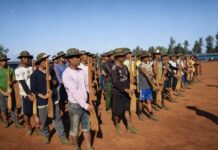By all accounts, the peace negotiation process is in shambles and there is no argument among stakeholders and observers alike about it

It all started out as a well meaning initiative of top leadership meeting between the government-military and Nationwide Ceasefire Agreement (NCA)-Signatory-Ethnic Armed Organizations (EAOs) to overcome the peace process stagnation, as the third 21st Century Panglong Conference hasn’t brought the desired positive result, but instead developed into a backsliding and more worsening situation.
The blame was put mainly on the military’s or Tatmadaw’s Commander-in-Chief Min Aung Laing, when he threatened the Restoration Council of Shan State (RCSS) with his famous phrase, “We won’t stay idle with hands folded,” if it continues to misuse the NCA-based peace process to its benefits. Additionally, his demand for the EAOs to yield to “non-secession” from union and “single army” as it is now structured, without alteration, pushed the NCA-based peace process to a near obliteration.
In the aftermath of the unsuccessful top leadership meeting in Nyapyitaw from October 15 to 16, the RCSS said that it won’t be participating in the Joint Ceasefire Monitoring Committee (JMC) as usual and the Karen National Union (KNU) temporary suspended all official peace process deliberations, reasoning that it would carry out informal meetings to first clear out the concept differences of NCA between the military and the EAOs
And in order to overcome this, the government National Reconciliation Peace Center’s (NRPC) Peace Commission (PC) travelled to Chiang Mai, Thailand, which has been the unofficial ethnic resistance groups’s foreign base for decades, to conduct informal meetings with the RCSS, KNU, Kachin Independence Organization (KIO) and the Karenni National Progressive Party (KNPP).
While the two former EAOs are NCA-signatories, the latter two are non-signatories.
RCSS

The first meeting was held with the RCSS on October 16, which was described as been very productive.
Accordingly, the RCSS reiterated its November 12 statement where it said its organization is committed to the NCA principles but would not touch on the issue of non-secession as it is not included in the NCA text. Other than that regarding the issue of a single army, the RCSS said they would find a way to resolve it through informal talks.
The main thrust of the RCSS message is that in order to have mutual understanding of JMC it demanded a meeting with Tatmadaw leaders, after which it will decide whether or not to continue participation in the JMC meetings. And chief among them is to interpret the state and union-level bilateral ceasefire agreements (BCAs), which the PC team leader Gen Khin Zaw Oo would report to the Commander-in-Chief, according to a reliable insider.
The RCSS statement also pushed for a change to the JMC structure, mechanisms and terms of references and for the consideration of a role for international experts in the JMC.
It is also likely the RCSS will toe the KNU temporary suspension of participation in all official peace process meetings, as it said there would be no use of attending them without KNU.
KNU

On November 17, the second meeting was conducted between the PC headed by Khin Zaw Oo and the KNU led by Saw Tah Doh Moo in Chiang Mai.
The informal meeting was said to be productive with both sides sharing concern and worries that the NCA-based peace process could be derailed, presumably, if the situation fails to improve.
Zaw Htay spokesperson for the PC said: “Both sides have solid commitment on the NCA-based approach and have discussed the difficulties, on how not to deviate from the approach and making it more stable.”
He added: “If both sides can go about with transparency and understanding the process will be faster. That’s why we accepted that discussion is needed. Both sides will report back (to their respective leadership) and work for most earliest meeting.”
KNU team leader and General Secretary Saw Tah Doh Moo emphasized the difference of NCA interpretation as: “In our informal discussion we tried to find answers. Our KNU position for the meantime is finding answers on how to overcome differing interpretation to the main peace process.”
At the end of the informal discussion, a press conference was held where he told the media: “NCA is the most appropriate approach and the KNU will stick to it. But we will have to try so that the NCA could proceed in a correct and justified manner.”
KNPP and KIO
On November 18, the PC met with KNPP and KIO, which are non-signatories of the NCA.
Hla Maung Shwe, a delegate of the PC summed up the two meetings as: “We were able to discuss the necessities (shortcomings) of trust-building due to implementation outcomes of the people at the basis. There is no outstanding issue left to be discussed regarding the signing of NCA. It (the KNPP) only needs to sign the NCA and we hope that it will happen soon.”
Besides, the KNPP discussed issues such as the disruption and prohibition of its public development training school; the killing of its three soldiers and one civilian by the Tatmadaw on December 2017 at KNPP’s temporary camp seven miles away from Loikaw, the Kayah’s capital; and the armed clashes that occurred between the KNPP and Tatmadaw during last year October.
Regarding KIO, “The KIO discussion is more within the mold of explaining its opinion,” said Hla Maung Shwe.
Reportedly, the KIO has earlier requested that the media be kept away from the informal meeting with the PC. And as a result nothing comes out on what has been discussed for the media to report.
Analysis
Although some keen observers of Myanmar politics are now describing the present peace process situation as being already shattered and is now in the process of having to restart it anew, which could be either a correct assessment or too pessimistically looking at scenario, one sure thing that could change for the betterment is trust-stimulating actions or implementations, coupled with refraining to impose pre-concieved ideas on negotiation partners.
What exactly should they be in concrete terms?
The trust stimulating actions, as time and again urged by well-meaning people are to stop the military offensives, withdraw Tatmadaw troops to their respective mother units or from a frontline to a safe distance, and call for all warring parties to join the peace talks, without precondition. These sort of undertakings would definitely foster trust-building.
Refraining from imposing one’s pre-concieved ideas to be on a level playing field with all negotiation partners is also another important part of peace-making and could help to build trust in negotiation process.
Thus, whether the informal meeting between the government and the signatory-EAOs, especially the KNU and RCSS, will be able to dispel the starkly depleted trust might depends on how much and to what extent the trust-stimulating actions can be carried out, including to what amount of degree the pre-concieved ideas of one party imposing on the others can be reduced, particularly from the part of the Tatmadaw and the government vis-à-vis the EAOs as a whole.











Leave a Comments